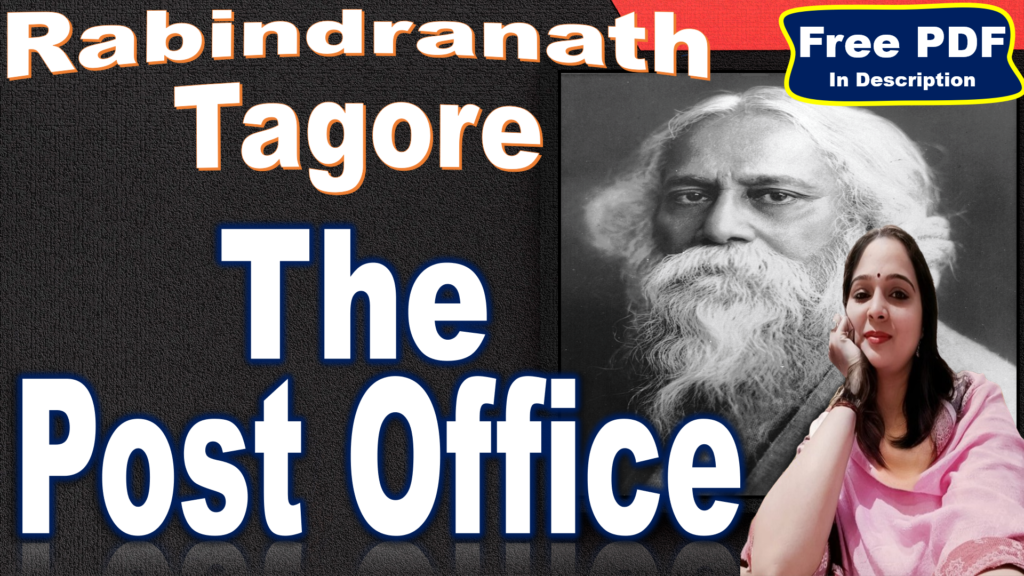
Essay Type Question
Write the critical analysis of the play “The Post Office” by Rabindranath Tagore.
Introduction
“The Post Office” is a play written by Rabindranath Tagore in 1912. Tagore, the first non-European to win the Nobel Prize in Literature, was a prolific writer, poet, and philosopher. His works often explored themes of love, nature, spirituality, and the human condition.
Themes
The play explores the themes of death, hope, and human connection. The theme of the play is “deliverance”, which the child discovers in death. However, a good deal of the drama is also about the earth, about the joys which Amal wants to find, by freeing himself from the limitations imposed by his uncle.
Symbolism
The play is rich in symbolism. The letter, coming from a distant mysterious land bringing a message from someone dear, is the most important suggestive symbol in the play. The Post Office itself provides a realistic background to the symbolism of the letter.
Characterisation
The story revolves around Amal, an orphan adopted by Madhav. Amal is sick and confined within a small room on the advice of the village physician. Despite his physical condition, Amal is fascinated by the outer world and imagines that the king’s postman will one day bring a letter for him.
Title
The title “The Post Office” is significant as it represents hope and a connection to the outside world for Amal. The Post Office also symbolizes the power of communication and the importance of human connection.
Structure
The story of the play is simple. Amal is an orphan who has been adopted by Madhav. He is sick and Madhav is most anxious to preserve his life. On the advice of the village physician, he has confined Amal within a small room as his contact with the wind and sun is considered harmful. His physical condition deteriorates and one day he sinks into eternal sleep.
Critical Comments
W.B. Yeats’ Preface W.B. Yeats, a renowned Irish poet and one of the foremost figures of 20th-century literature, provided a preface to “The Post Office”. In it, he emphasized “deliverance” as the central theme of the play. This theme is embodied in the character of Amal, who despite his physical confinement, yearns for freedom and connection with the outside world. Yeats also appreciated the play for its structure and the emotions it evokes. The play’s construction allows for a seamless flow of events and character interactions, while its narrative imbues a sense of gentleness and peace. This is reflective of Tagore’s masterful storytelling and his ability to evoke profound emotions through his works.
Dr. B.C. Chakravorty’s Analysis Dr. B.C. Chakravorty offers a unique perspective on Tagore’s spiritual realism. According to him, “deliverance” is not something to be sought in the afterlife or another world, but rather in this very life. This perspective is a departure from traditional mystic poets and dramatists who often focus on the spiritual realm or the afterlife. Tagore, on the other hand, emphasizes the potential for spiritual liberation within the confines of earthly existence. This is evident in Amal’s longing for the outside world and his eventual “deliverance” through death, which is portrayed not as an end, but as a form of liberation.
Contemporary Relevance “The Post Office” continues to resonate with readers today, more than a century after its initial publication. Its themes of hope, love, and the human spirit remain relevant in contemporary times. The story of Amal, a child confined within a room yet yearning for the outside world, mirrors the human condition of longing for freedom and connection. The play’s rich symbolism and profound themes continue to inspire readers and scholars alike, making it a timeless masterpiece in the realm of literature.
In conclusion, “The Post Office” is a timeless work that continues to resonate with readers today, and its themes of hope, love, and the human spirit are as relevant now as they were over a century ago. The story embodied in the play–the sickening loneliness telling upon a child of an aristocratic house–presents the child Rabindra’s own experience of bondage and response of a lonely child, while it is also rich in symbolic meanings, and gives full expression in the perception of the Universal Spirit in its immanent form.





